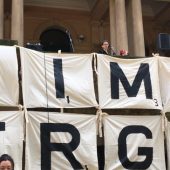
Transformative sustainable pedagogy and public intellectual work share the same aims and guideposts, including upholding higher education’s foundational intentions of fostering moral character in tomorrow’s leaders. Radical modes of sustainable education, including regenerative pedagogy, which tends to the global shift to restore, respect, and regenerate ecological and societal balance, and inside-out pedagogy, which helps learners take their inner seeds, sprouts, and blossoms of good ecocultural intentions to stages of external fruition, speak both to educating learners and engaging the public. If pedagogues aim to encourage students to put beliefs into action and be leading voices in ethically addressing today’s pressing environment and society problems, this may require role modeling by having the courage to do so themselves. In these contexts, the author relates her own experiences speaking for Extinction Rebellion as an illustration of expanding notions of what it means to be a sustainability educator today.
Continue ReadingThis essay presents an exploration of a wide spectrum of current ecocultural relations through the creative methodology and expression of performance. We present a script of a performance inspired by a seemingly simple prompt for a pedagogical free write exercise “When I say ‘nature,’ I mean…” The goal of the free write exercise is to illuminate and open up for questioning and transforming our cultural assumptions, embodied meanings, and social constructions associated with the idea of “nature.” The authors/performers reflect about the process of creation and their intimate struggles with environmental ideologies often hidden behind the veil of common sense, political posturings, or disciplined concealments. As an art form, performance allows engagement with imaginations that emerged as radical, thus insinuating the need for a more nuanced and free scholarship, as well as for embracing performance as liberating pedagogic activism.
Continue Reading